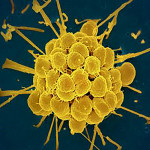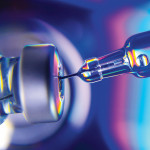Human papilloma virus-like particles, non-infectiousagents that have been used in vaccines against cervical cancerassociated with human papilloma virus (HPV), also appear to inhibitHIV-1 replication in vitro, researchers report in the March 1st issueof Blood.
“As with other vaccines, the HPV-like particles activate the immunesystem after vaccination,” senior researcher Dr. Tomozumi Imamichi toldReuters Health. Dr. Imamichi of the National Cancer Institute,Frederick, Maryland, and colleagues tested the effect of HPV-likeparticles on HIV-1 replication in peripheral blood mononuclear cells,CD4+ T cells and macrophages.
The team found that HIV-1 replication was suppressed by the vaccine,but it did not affect the expression of CD4, CXCR4 and CCR5. Solublefactors appeared to be involved and further study indicated thatcytokine IL-27 was the agent responsible for this inhibition.
“IL-27 is known to be a potent anti-cancer cytokine,” continued Dr.Imamichi. “We need further investigation to define the molecularmechanism of the anti-viral effect by the cytokine.”
In addition, he concluded, “we need to further study whether thevaccine induces the production of IL-27 in HIV-1-negative patients.”






Comments
Comments